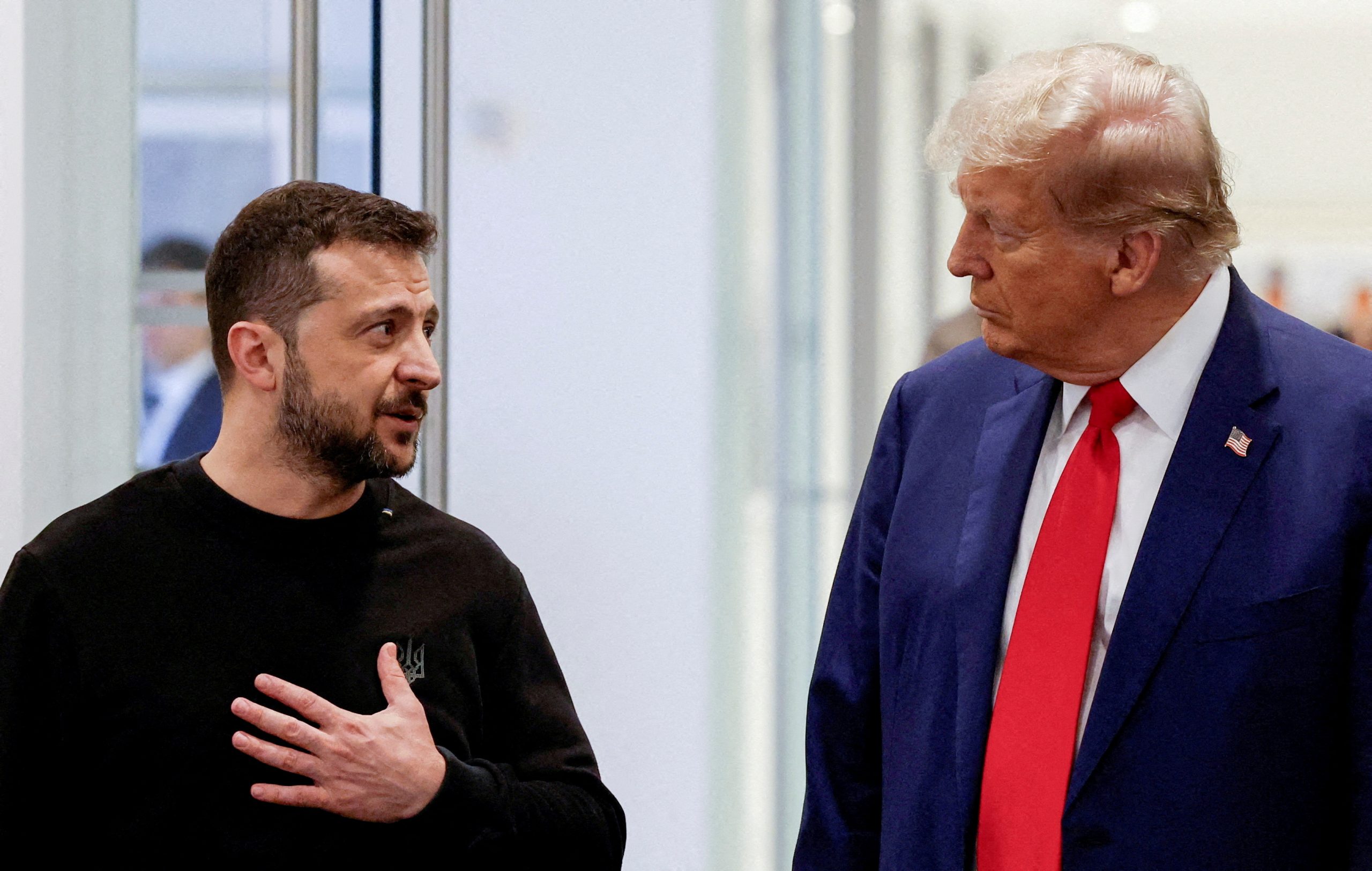President Trump has dramatically shifted the direction of U.S. foreign policy in four short weeks, making the U.S. a less reliable ally and retreating from global commitments in ways that stand to fundamentally reshape America’s relationship with the world.
His top envoys have floated concessions to Russia in peace talks that stunned European allies, followed by Trump calling Ukraine’s leader a dictator , and he kept Europeans at arms length as the negotiations began. He has dismantled the leading U.S. aid agency providing assistance to the developing world where China aims to establish a foothold. Trump’s plan to own Gaza and remove Palestinians from the enclave erased decades of Washington’s efforts to broker a two-state solution. And his plans to increase tariffs heralded an end to American-fueled globalization.
No one expected Trump to handle global affairs like his predecessors. But few expected him to move so rapidly to reorient U.S. foreign policy away from the course it has charted since 1945.
Since the end of World War II, the American-led system of alliances has bolstered U.S. power, most foreign policy experts say. By vowing to defend allies in Europe, the Middle East and Asia, the U.S. more than any other country took on the role of global guarantor of free trade and stability, a mission that included countering first the Soviet Union and, more recently, China.
Trump has a different take: Allies take more than they give. Instead of relying on the U.S. military and its nuclear umbrella for their security, other countries should spend more on their militaries while providing economic incentives to stay in America’s good graces. Trump’s is a far more transactional, win-lose vision of foreign policy.
“It’s not that President Trump is abandoning the post-World War II order,” said Victoria Coates, vice president for national security and foreign policy at the Heritage Foundation, a conservative think tank. “It’s that we are no longer in the post-World War II era and we have to accept that the geopolitical landscape has shifted.”
The same approach drove Trump’s first-term foreign policy but in his second term he has injected a new element, proposing to expand U.S. borders and take territory overseas unilaterally.
Even before returning to the White House, Trump mused about reclaiming the Panama Canal, seizing Greenland from Denmark and making Canada the 51st state. When he repeated the notions after taking office, it turned what had been far-fetched ideas into possible U.S. policy and a signal of intentions to countries worldwide.
“It will be very difficult to undo what is being done in foreign policy or to persuade allies this was a never-to-be repeated one off. This was possible after Trump’s election but not his re-election,” said Richard Haass , president emeritus of the Council on Foreign Relations and former senior official in Republican administrations. “America’s reputation for reliability and predictability has been seriously compromised.”
Recent events have only deepened allied suspicions about a Trump-led America.
Last week, Trump agreed to negotiations that could end Moscow’s global isolation following a call with Russian President Vladimir Putin . Defense Secretary Pete Hegseth later said peace talks to end the war in Ukraine wouldn’t see the country join the North Atlantic Treaty Organization—a win for Moscow even before diplomacy began. Hegseth walked the comments back, insisting that all options remained on the table, but allies immediately sensed the U.S. under Trump cared little about trans-Atlantic unity.
During a speech Friday at the Munich Security Conference, Vice President JD Vance called out European allies for what he said was a subversion of democracy—without discussing how to end the large conflict to the east. European governments asked for a seat at the Ukraine-Russia table, only to have U.S. officials say they couldn’t attend the talks but would have their views taken into consideration.
“What’s happening is a serious challenge to the foundation of the post-World War II world order,” said Chuck Hagel , the former Republican senator turned defense secretary in the Obama administration. “I’ve never felt so concerned about the future of this country and this world as I am now.”
The yawning trans-Atlantic gap widened further this week. On Tuesday, after negotiations in Saudi Arabia between U.S. and Russian officials ended, Trump blamed Kyiv for starting the war, though it was Russian forces that poured across the border three years ago, when Putin ordered the full-scale invasion. Trump’s remarks prompted Ukrainian President Volodymyr Zelensky to say the U.S. president was parroting Kremlin disinformation.
Trump responded Wednesday with the harshest tirade against Ukraine by any U.S. official since the war began, calling Zelensky a “Dictator without Elections” on social media. Zelensky’s term expired last year, but elections were postponed as Ukrainian legislation prohibits holding them while the country is under martial law.
The tilt toward Russia and away from Ukraine has rewarded Moscow for appealing to Trump, said Ivo Daalder , the U.S. ambassador to NATO during the Obama administration.
“He has adopted Putin’s talking points,” Daalder said. “Putin is now in the excellent position of having only to say ‘Da ,’ knowing that if Ukraine says ‘Nyet ,’ Trump will blame Kyiv.”
That, of course, isn’t how the Trump administration sees it. “President Trump’s leadership has created the first opening for talks in years, and he did this after only four weeks in office,” said National Security Council spokesman Brian Hughes. “He is leaving no stone unturned as it relates to finding a peaceful resolution in Ukraine—something the previous administration abysmally flunked.”
Justin Logan, director of defense and foreign policy studies at the Cato Institute, a libertarian think tank in Washington, said it was high time an American leader acted in a way that persuaded Europeans to care more for their own region. “Trump is fulfilling an American vision that goes back to Dwight Eisenhower , who worried in 1959 that Europe’s lackadaisical attitude toward its own security was turning Uncle Sam into Uncle Sucker,” he said.
“There are howls of outrage up and down Massachusetts Avenue think tanks as consensus pieties are being uprooted and burned,” Logan continued. “If Americans are lucky, that outrage will continue.”
But America’s posture abroad had shifted even before the Ukraine dust-up.
The Trump administration in its first weeks dismantled the U.S. Agency for International Development, freezing billions of dollars in foreign assistance for programs that treat AIDS, track pandemics and provide maternal care. Programs from Latin America to Africa to Asia were paused, eroding years of trust built up by the U.S. government and its partners in developing areas, aid workers say.
Secretary of State Marco Rubio , who as a U.S. senator spent years praising USAID as a bulwark against China, is now presiding over a vastly reduced assistance program, which Democrats and foreign aid workers say will only benefit U.S. adversaries investing in regions that the U.S. abandoned. China has already told Communist leaders in Nepal that Beijing is ready to fill the funding void in the country left by USAID.
The impact of the withdrawal in Nepal and elsewhere “will affect how people around the world see the United States,” said Sen. Jeanne Shaheen (D., N.H.), the ranking member of the Senate Foreign Relations Committee. “It leaves a vacuum that is going to be filled by China, by Russia, by our adversaries.”
Meanwhile, Trump administration officials say the president’s approach has produced early wins. The talk of controlling the Panama Canal led Panama’s president to abandon China’s Belt and Road Initiative, minimizing Beijing’s influence in the Western Hemisphere. And despite proposing to dislodge Palestinians from Gaza while the U.S. rebuilds the seaside strip, Trump has continued to hold what administration officials describe as productive meetings with Middle Eastern leaders including Israeli Prime Minister Benjamin Netanyahu and King Abdullah II of Jordan.
Not all of Trump’s critics say that the president is irrevocably changing U.S. foreign policy.
John Bolton , Trump’s former national security adviser who turned against his former boss, said the president doesn’t have a coherent enough ideology to dismantle the global order.
“This is one man’s view, but unfortunately he’s the president,” Bolton said. His advice to allies: “Just grit your teeth.”
Write to Alexander Ward at alex.ward@wsj.com



